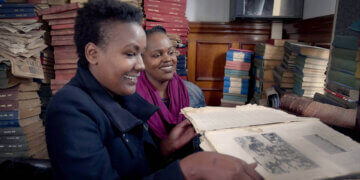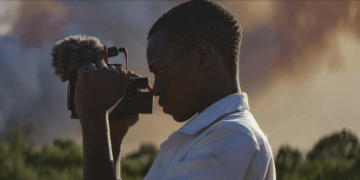Free Money is a documentary years in the making about a social experiment conducted in a small rural village of Kogutu in Western Kenya. It’s all in the title, really. Residents of this village are given free money, or, Universal Basic Income. Directed by Lauren DeFilippo and Sam Soko (Softie), and produced by LBx Africa, this is a wonderfully made documentary about a rather questionable ‘experiment.’ It charts four years of development when an American NGO named GiveDirectly sets its sights on two villages near Lake Victoria with the intent of giving every person $22 a month for the next eighteen years.
This news is received with excitement and scepticism in equal measure by the residents of these villages. Some of them even invoke the theory of illuminati, and others refuse to take the money for fear of unseen future consequences. GiveDirectly, a company based in New York, sent indigenous agents to speak to the locals in their own language, explaining to them the social ramifications, and the kind of impact accepting the money would have on the whole world, and its future. Eventually, the registration process began.
It’s heart-warming to see people who’ve suffered a bad hand in life smile and have excitement to live the next day, and the one after that. GiveDirectly made that a possibility in these two villages but it also had some unwanted side-effects. Obviously, some people felt envious and bad about not being lucky enough to be chosen as a recipient of literal free money. During the registration, in order to uphold the integrity of their experiment, GiveDirectly had to abide by a strict set of protocols and rules. This, by consequence, left some residents rightly unhappy. There’s a young girl by the name of Jael who elicits sympathy from both the viewers and one of the aforementioned agents, who has to tell her, due to several reasons, she does not qualify for the money. But there is a mix-up, and things are hazy. She waits for it for years. All she wants is an education like everybody else her age. They suspect she was not living within the village and only came to receive the funds. Eventually they rule that she does not qualify, and deny her registration.
This moment demonstrates to me the fundamental inability for a corporation to be human. Their entire M.O. sounds very philanthropic, and in a lot of ways, it is, but, watching them film Jael wonder about whether they’ll give her money or not made me a bit queasy. The documentary makes up for this splendidly in the end, when the members of the village decide to contribute money towards her school fees. When these people smile, they smile; and that statement will only make sense once you watch Free Money. Poverty is such a big and inhuman problem, especially given how hard it is to get out of it, that when you see it ‘cured’, you believe in the goodness of the human race again.
There’s a young man who travels from the village to Nairobi, our capital city of the future, after completing his high school education to start a small business, and hopefully secure a working financial model for himself after GiveDirectly. He was given fish, and endeavoured to learn fishing instead. When his plans (cutting hair at a barber shop, which is sadly only shown once and never again discussed) don’t pan out like he expected them to, he calls home, to his mother, and tells her that he’s broke, and that he’ll be going back home. Personally, I admire almost everything about him. He’ll do well with or without GiveDirectly. Some scenes here are staged to give the documentary an extra punch, and this is to me no issue of integrity.
Larry Madowo also appears, as himself; a journalist who grew up not too far from Kogutu and Kisumu, now a celebrated international correspondent at CNN. He has an interesting conversation in the film with the co-founder of GiveDirectly, Michael Faye, and tells him to his face, if he knows whether in Kenya, NGOs are referred to as ‘nothing going on.’ I love Larry. Anyway, he asks Faye whether he truly believes this experiment is doing enough good, and whether it will solve the root problems of the village. Needless to say he wasn’t a stout believer of their mission statement. Faye’s response, which I agree with, is that there are so many issues that would or would never be solved in 100 years, climate change et cetera, so what should they do in the meantime? Let people die? Apparently, the amount of money needed to end poverty is $100 billion dollars. The global GDP is about $100 trillion. Surely, we should be able to spare that 0.01% to end the inhumane cross of poverty. If you earn $100,000 a year, just give a single $100 bill and your service is complete. Which brings me to the next interesting point.
Socialism? Oh man, is this the beginning of a new world order of socialism? The emperor of earth (at the time of this writing, has not yet conquered Mars), Elon Musk, has a seven second clip, a press interview, in which he states his belief that a universal basic income would be inevitable in a world that’s becoming nearly all-the-way automated. He’s one to talk, pushing out all those self-driving Teslas. Fox News of course had several animated conversations, in that brash argumentative manner of theirs, about whether these exercises would shift the global economic model to socialism, or, God, communism! During COVID-19, the Americans were dealing with this very question when President extraordinaire Donald Trump announced that due to the pandemic, they would also receive free money. But capitalism will never die. Never. It’s too strong. A Fox News reporter said, and I kid you not, “Now that people are getting free money, they’ll have more confidence to just go out there, and spend.”
But the question remains, what positives does this experiment offer its chosen specimen: the people of Kogutu village? At the beginning of the documentary, which according to my math is the year 2013 (if this is false, let it be known that I’m better with language), the place looked traditionally rural.
It’s shagz. Ten years have now passed, and looking around the place in the present day, not much development has taken place, in terms of infrastructure and quality of life. How have these people used the money? Well, mostly for food and bills. But they weren’t starved before GiveDirectly, the experiment only made their meals easier to come by. Did this convenience embolden the villagers to discover ways of becoming self-sustaining, or did it lull them into complacency? All evidence indicates the latter. Point for Larry Madowo. $22 a month hasn’t changed much in their lives, and GiveDirectly would have had a better shot at playing the saviour had they given these villagers the tools to their freedom, to pick the ax, as it were, opposed to the coal. Their fundamental interest seems to be on the future of Universal Basic Income and being the first company to have data on its outcomes and processes, rather than uplifting the village of Kogutu. Michael Faye isn’t even shown outside of his New York office; he just gets data sent back. Kogutu is ultimately playing the role of a guinea pig in this experiment, which by all views looks benign, but isn’t really once you put yourself in the humongous shoes of the corporation.
This model is only sustainable if it’s practiced by the entire state. Musk is right, of course. Universal Basic Income is an inevitability of the human race; it’s bound to happen, necessary even. But will it be socialism? I think not. The people of Kogutu, God bless their hearts, have, generationally, been victims to a poor quality of life, and are thusly underexposed to investment methods and growing of monetary wealth. Once it becomes a worldwide phenomenon, Universal Basic Income, I think would usher in some kind of new economic model. A hybrid, if you will, of capitalism and socialism. The people of Kogutu sleep easier, however, and despite my scepticism, that ought to count for something.
Free Money is now streaming on Netflix.
Never miss a moment.
Get the latest stories from Sinema Focus delivered straight to your inbox. Subscribe now.











